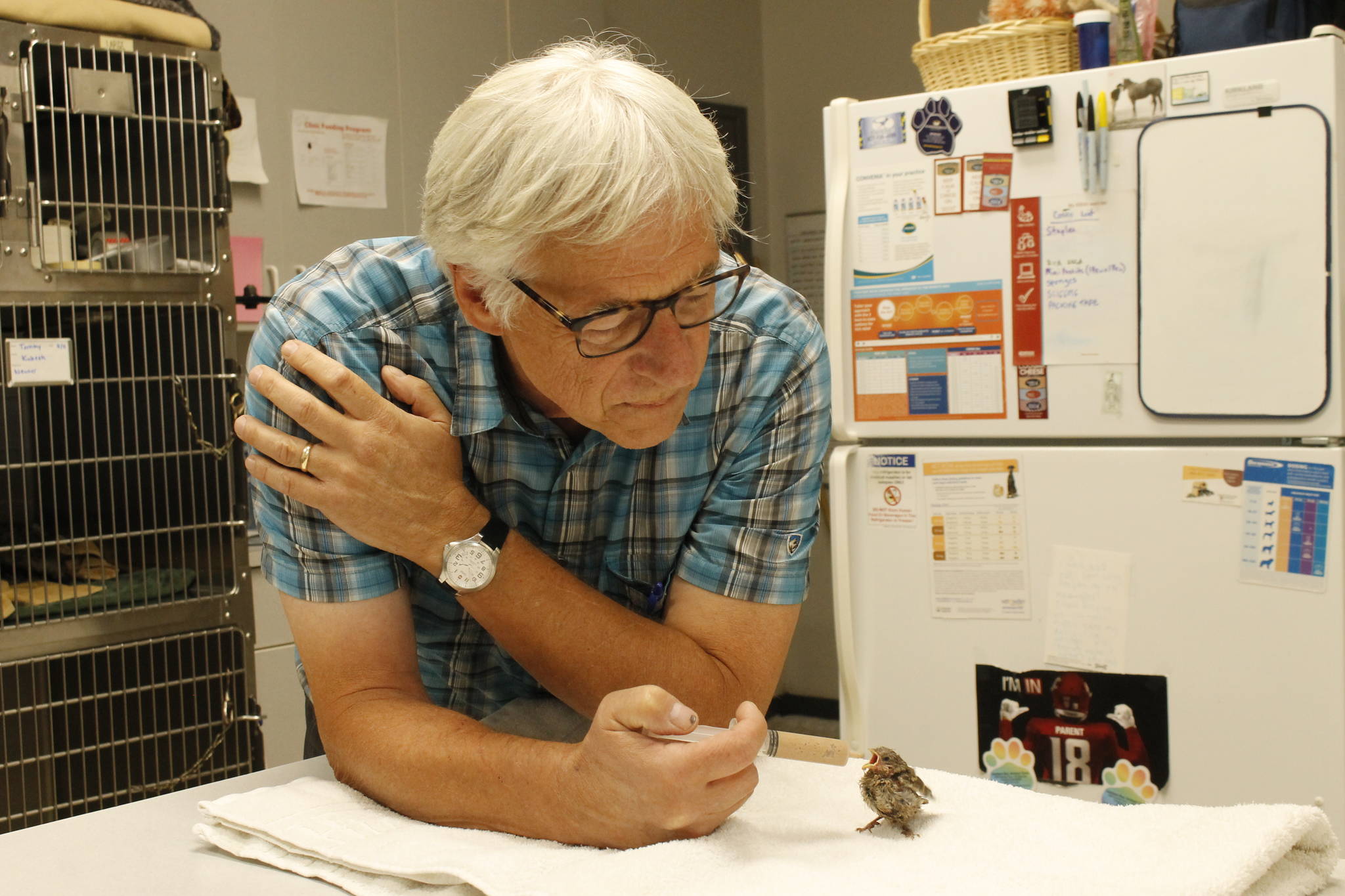Countless chickens, eagles, owls and other fowl owe their lives to David Parent, a veterinarian who is set to retire at the end of this month after a 31-year career in Freeland.
Over the years, community members have not hesitated to call upon the help of Parent, who is accustomed to treating wildlife as often as domestic animals at his vet practice, Useless Bay Animal Clinic.
In 2021 so far, Parent estimated that he has seen over 60 wild birds and mammals. He hasn’t been afraid to be “the guy that goes out and gets eagles” when the sheriff’s office or a concerned island resident calls him about finding an injured bird.
“It’s something I do on a daily basis and I don’t think it’s a very big deal,” Parent said. “It just makes life more interesting when I have something new and unusual to treat.”
But besides the raptors, he also has just as much love for small dogs — especially terriers.
“I like them all except for when they’re trying to bite my face off,” he said with a laugh.
Parent first came to Whidbey Island on Labor Day Weekend in 1990, a few years after graduating from veterinary school. He bought Useless Bay Animal Clinic from the former owner, borrowing money from his siblings during the process.
“I didn’t have any money at the time so I had to borrow from my brother and sister, who footed me the down payment,” he said.
The current building the clinic is located in was built in 1994.
Last December, Parent sold the business to his partner of six years, Kristen Reiter.
Reiter said it has been difficult watching the shelves being cleared out and knowing that Parent will be leaving soon.
“He’s a dear friend,” she said. “He’s been my mentor. I came here with 15 years of experience and I learned more in my first year being here than I learned in my first 15 years.”
She added that a lot of people go into veterinary medicine because they love animals, but often forget about the human element to the job.
“They forget there’s a human attached to the other side of the leash,” she said. “He’s taught me a lot of my people skills.”
Due to a few chance encounters with strangers during his career, Parent has been invited to help research different aspects of wildlife, including a seabird survey in Glacier Bay National Park and Preserve in Alaska and a hibernating lemur study in Madagascar.
Previous articles in the South Whidbey Record have earned him a taste of fame statewide. A few years ago, readers who saw a story about him treating an injured bald eagle recognized him on the ferry and called him “eagle man.” Halfway across the state at a rest area near Ellensburg, readers from Montana who saw the same story asked him if he was “that eagle guy from Useless Bay.”
Parent said he has seen many changes on Whidbey over the years, including the dependence on pets as companion animals during the COVID-19 pandemic.
When a pet is cremated these days, about every other owner wants to keep the ashes, which wasn’t always the case.
“They’ve taken on a much greater importance than I thought they ever would,” he said of the animals.
He’s worked hard to keep the clinic in the hands of local owners, which he said has helped ensure there’s a treatment plan in place for people coming from all walks of life.
“Here we are on the south end of an island and we treat animals for the billionaires and for the very poor people,” he said. “You have to have a plan for everybody.”
“I’m not more important than the person who cleans the kennels,” he added. “We all have a job to do and we’ve got to work together.”
Although he’s treated many interesting animals over the years, the most rewarding thing for him has been giving an animal a chance when it doesn’t look like there’s any possibility of recovery.
Kat Hart, a client assistant who works at the clinic, has a three-legged pitbull named Rocko who had a mysterious mass in his abdomen last April.
It turned out to be a retained testicle that had turned into a giant tumor over the years. Parent was able to remove the lump, and since then, Hart said her dog has been much more playful and happy.
“I thank Dr. Parent for saving his life,” Hart said. “He’s, of course, very modest.”
In his retirement, Parent intends to still help the clinic with saving wildlife — provided that he is on the island at the time. He has plans to travel extensively, citing several different places on his bucket list where he would like to go, such as Bhutan and the Galápagos Islands.
Parent’s last official day on the job is Tuesday, Aug. 31. A retirement party open to the community will be held 2-5 p.m. that same day at Freeland Hall. Masks are encouraged, since it is an indoor venue. Light refreshments will be available.


